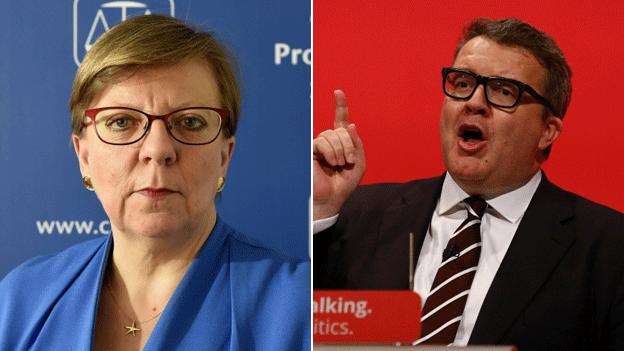Tom Watson's letter in full about the Lord Brittan case
- Published

The letter to Alison Saunders (left) was sent by Mr Watson (right) in April 2014
Below is the full letter that deputy Labour leader Tom Watson sent to the director public prosecutions Alison Saunders in April 2014 urging her to look again at the Lord Brittan allegations.

Dear Alison
I am compelled to write and seek review of an historic case of rape. Unusually, and contrary to current practice and the ACPO/CPS Guidance on the Investigation and Prosecution of Rape Cases, the investigation into the serious allegations in this case was dropped before the suspect was interviewed.
The elements of lack of freedom and capacity to consent - which may even have triggered the "no consent" legal presumption - make the decision highly irregular. This is shocking in itself. It further troubles me that the senior police officer who dropped the case revealed to the victim he apparently took a series of worthless stereotypes and other irrelevant points into consideration. He did this after apparently consulting with an unnamed CPS official. Most of these stereotypes have been blown out of the water in recent months. Or so I thought.
There has been a sea change in the climate surrounding rape, historic cases in particular. Why is it that the tide has not reached this case? I am driven to the unpalatable conclusion that the identity of the alleged perpetrator - Leon Brittan - may in some way have influenced treatment of the case. I hope I am wrong. But in my view the case demands your personal attention and an immediate review by the CPS Area Head of Sexual Offences.
As you know, I have been working with the Metropolitan police on a number of cases involving sexual crimes over the last 18 months. I have been the recipient of a considerable amount of information from victims directly, much of which I have passed on to the police. You will know that some of this information has already led to arrests. I anticipate that, under your leadership, more work will follow.
I enclose a contemporaneous note written by victim _________ of a rather blunt conversation she had with DCI Settle concerning his decision to drop the case. I invite you to note, in particular, that he told the victim - who had been locked in a flat and tried to escape from the bathroom window:
"There is no evidence he asked you for sex, forced you to have sex, or asked you to take off your clothes, which you did voluntarily"
This was apparently considered to be a fatal deficiency. Perhaps unsurprisingly, the victim has not has this confirmed in writing as promised.
I asked _______ to share her thoughts after her experience of reporting a crime. These are her words:
"My feelings are that I have been brutally misled having been encouraged by the DPP statements to come forward with my historical case following the Savile affair. All the public pronouncements after Savile suggested that these investigations would be treated sensitively, non-judgmentally and in a victim-centric way. I have been interviewed twice in long, harrowing video sessions first by ______ Police, then MPS [Metropolitan Police Service]. I have been encouraged by the MPS to believe that my evidence is both credible and corroborated. I have repeatedly had to relive the most harrowing night of my life, long pushed to the back of my mind. Then, when I had the temerity to question a police decision I have been turned on by a senior police officer, apparently with the support of the CPS. I have been implicitly accused of making an allegation against someone because 'it is all about who he is'. I have been implicitly accused of being a slut because I sat on a bed. These are attitudes that women of my generation associate with the police and prosecution authorities of the sixties and seventies, not an enlightened and publicly accountable twenty- first century service. It was these attitudes that made me think I would get nowhere if I proceeded with the case when the rape happened. It seems nothing has changed". I have found myself appalled at the conduct of this investigation. I would like to believe that it is not typical of the CPS and Metropolitan police as a whole. However the case raises some very serious questions which are likely to remain unanswered without your attention.
In the light of this, please could you confirm to me that:
The remarks made by DCI Settle do not represent existing CPS policy
The case will be fully reviewed as a matter of urgency by the CPS Area Head of Sexual Offences
The investigation, including interview of Leon Briton, will be completed and ACPO CPS Guidelines followed
The entire historic caseload of allegations made against Leon Brittan- including that way in which each allegation was treated - is reviewed, including those by alleged victims '______' and '_______'
You will read the reviews yourself, providing input as required.
Everyone is complicit in the failures of the past. But we have an opportunity now to put matters right. Any attempt to perpetuate a CPS in which a victim's acquiescence in or inability to escape rape is a barrier to prosecution would fail, with grievous consequences, and would be wrong. There is a strong public interest in getting this right.
I have every confidence that your leadership, and personal intervention in this case, will take the CPS in an altogether better direction.
- Published12 October 2015
